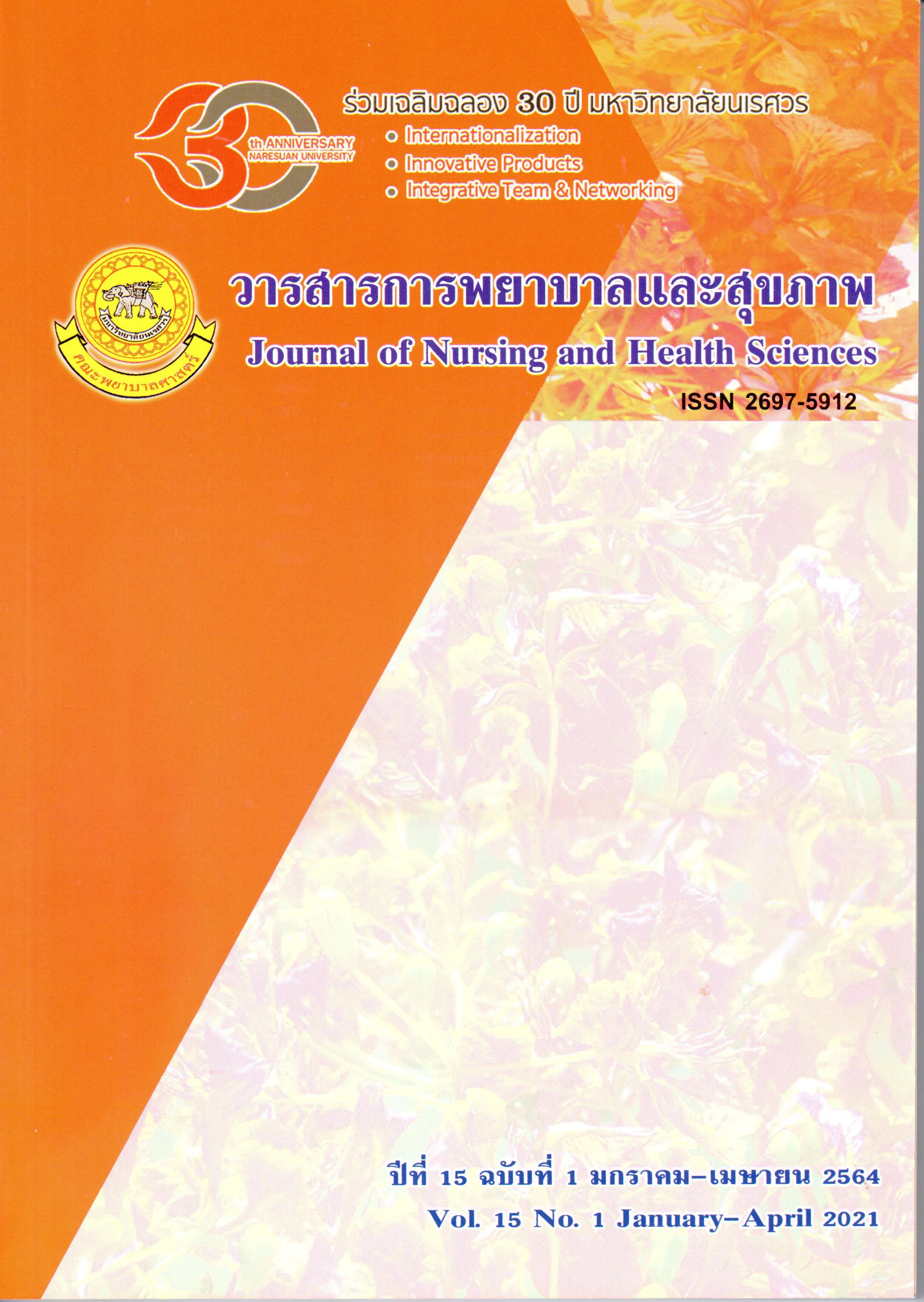The Social Media : How to Apply for Breastfeeding Promotion
Main Article Content
Abstract
Breastfeeding has good effects on baby’s health such as reducing mortality, the occurrence of obesity, chronic disease, and infectious diseases. It also satisfies the basic needs of the baby. Breastfeeding is also beneficial to the mother. It reduces the chance of postpartum hemorrhage, breast cancer and endometrial cancer. (World Health Organization, 2017). World Health Organization recommended that the baby should be exclusively breastfed 6 months. After that, the breastmilk was given together with food by age until the age of 2 years or more. The survey results for exclusive breastfeeding rate in Thailand is still low. In 2019, only 14 percent of infants under the age of 6 months were receiving only breast milk. (National Statistical Office, 2020) Although many hospitals are promoted as a baby-friendly hospital initiative and work on the ten steps to successful breastfeeding policy. Nurses play a critical role to promote successful breastfeeding. Nowadays, social media has played a huge role in people's daily lives. The application of social media to promote breastfeeding is an attractive. So the authors analyzed the application of social media to promote breastfeeding based on the Social Support theory (House, 1981) to find an effective way to promote continued and effective breastfeeding.
Article Details

This work is licensed under a Creative Commons Attribution-NonCommercial-NoDerivatives 4.0 International License.
References
Churchill, E.F. (2012). Social media meaning. Proceeding of the 2012 international workshop on Socially – aware multimedia. https://dl.acm.org/doi/proceedings/10.1145/2390876.
Chiengta, P., Baosoung, C., & Kantaruksa, K. (2014). Effects of social support on success in exclusive breastfeeding among primiparous mothers. Nursing Journal, 41(3), 1-12. [In Thai].
Datareportal. (2020). DIGITAL 2020: THAILAND. https://datareportal.com/reports/ digital-2020-thailand.
El-Houfey A., Saad, K., Abbas, A. M., & Rashad, S. (2017). Factors That Influence Exclusive Breastfeeding: A literature Review. International Journal of Nursing Didactics, 7(11), 24-31.
House, J. S. (1981). The nature of social support in M.A. Reading (Ed.), Work stress and social support. Addison–Wesley.
Kasemsuk, J. (2011). Communication and social change. Chulalongkorn University Press. [In Thai].
Kesornprom, B., Kantaruksa, K., & Sansiriphun, N. (2015). Effect of social support on success in exclusive breastfeeding among adolescent mothers. Nursing Journal, 42(4), 156-167. [In Thai].
McKim, E. M. (1993). The information and support needs of mothers of premature infants. Journal of Pediatrics Nursing, 8(4), 233-244.
Much, D., Beyerlein, A., Roßbauer, M., Hummel, S., & Ziegler, A. G. (2014). Beneficial effects of breastfeeding in women with gestational diabetes mellitus. Molecular metabolism, 3(3), 284–292.
National Statistical Office. (2017). Thailand multiple indicator cluster survey 2015-2016. https://www.unicef. org/thailand/media/176/file/Key%20Findings%20from%20Thailand%20Multiple%20Indicator%20Cluster%20Survey%202015-2016%20(English).pdf. [In Thai].
National Statistical Office. (2020). Multiple Indicater Cluster Survey 2019 (Final Report). National Statistical Office. [In Thai].
Open Government Data of Thailand. (2021). Broadband penetration per population (%). http://ttid.nbtc. go.th/internet_hou.
Prayong, P. (2019). Social media usage of mothers for seeking information about mother’s breastfeeding:
the case Study of “Sutheera Uerpairojkit” facebook fan page. Journal of journalism, Thammasat University, 12(2), 40-86. [In Thai].
Rakjing, P., Rotrat, W., Engchuan, W., & Raksanam, B. (2018). Effectiveness of social care network model on self-care and infant care of postpartum mothers in sikao hospital trang Province. Thai Journal of Public Health and Health Sciences, 2(3), 69-79. [In Thai].
Rujirapong, S. (2019). Effect of self - efficacy monitoring and promoting program through facebook on success in 12 weeks. Journal of Nursing, Public Health, and Education, 20(2), 69-81. [In Thai].
Roger, E.M. (1995). Diffusion of innovation. 4th (ed). The Free Press.
Sangploy, T., Sriarporn, P., & Xuto, P. (2016). Effect of social support on breastfeeding behavior among mothers with preterm delivery. Nursing Journal, 43(3), 13-23. [In Thai].
Tamdee, P. (2106). The path of breast milk: Identity of modern working mothers and difficulties in motherhood. Journal of Social Research, 39(1), 1-37. [In Thai].
Wichainprapha, A., Mekkamol, K., Saetang, K., Porm-in, K., & Srivirun, S. (2017). The model of mother’s self-management regarding exclusive breastfeeding for 6 months: a case study at Bo Sub-district, Khlung District, Chanthaburi province. Journal of Phrapokklao Nursing College, 28(2), 29-41. [In Thai].
Williamson, A. (2013). Social Media Guidelines for Parliaments. http://archive.ipu.org/PDF/publications /SMG2013EN.pdf.
Wipoopinyo, W. (2020). Failure factor on exclusive breastfeeding in Chaiyaphum hospital. Medical Journal of Srisaket Surin Burirum Hospitals, 35(3), 635-642. [In Thai].
Wongtongmana, N. (2018). Social Media with a Nurse in the Era of the Digital Society. Thai Red Cross Nursing Journal, 12(1), 13-22. [In Thai].
World Health Organization. (2017). Continued breastfeeding for healthy growth and development of children. https://www.who.int/elena/titles/bbc/continued_breastfeeding/en/
Xuto, P. (2020). Nursing and midwifery: women in the labor and postpartum period. Textbook Project, Faculty of Nursing, Chiang Mai University. [In Thai].


